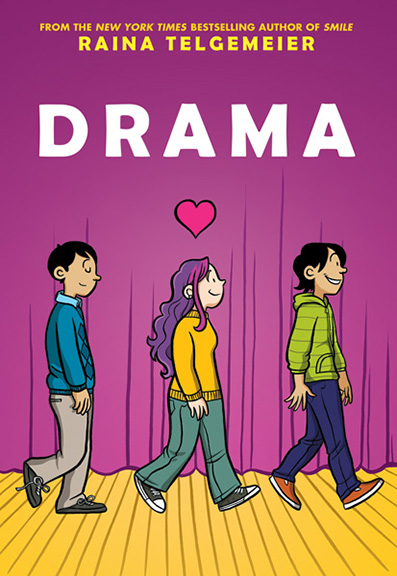
Drama is under attack again. After several failed attempts to have the book removed this year, one parent has started a petition to change the book lending policy for the Columbia County School District in Georgia.
As reported in The Augusta Chronicle, everything started in January, when Katie Allen, the parent of a seventh-grader at Harlem Middle School, objected to the material inside the multiple award-winning graphic novel Drama by Raina Telgemeier. It was a book that her daughter had checked out of her teacher’s classroom. Allen submitted a challenge in February to both Harlem Middle School and later Euchee Creek Elementary. Harlem retained the book, and Euchee Creek decided to limit the book strictly to fifth graders.
The district also responded to the complaint by agreeing to update their policy, giving parents the option to opt out of allowing their children to borrow books from the school or teacher libraries. Allen has now created a petition calling for an added disclaimer to the borrowing policy. The addition reads,
The Columbia County School District hereby informs parents that Media Centers and Teachers Libraries may provide material containing sensitive topics such as sexuality, homosexuality, and/or transgender ideology.
Allen’s challenge to the book, and her proposed change in language, highlight a key issue with censorship in schools and libraries. Specifically, identity censorship, a form of censorship that targets books and speakers based on the identity of the author or characters in a book. LGBTQ+ communities are often the target of this type of censorship.
Drama itself has a long history of challenges. The 2012 book by Raina Telgemeier has made the Top 10 Most Frequently Challenged Books list five times. As detailed in the CBLDF Case Study, “a small but vocal minority have objected to the inclusion of two gay characters, one of whom shares a chaste on-stage kiss with another boy.”
Time and again, these challenges originate from people objecting to the “appropriateness” of LGBTQ+ themes and characters. Allen’s proposal to “warn” parents in the policy amounts to a stigmatizing gesture. Students have the right to see themselves represented in literature without a warning label. In a 2017 interview for the School Library Journal, Telgemeier was asked about making the Challenged Books list; she responded,
“I had a lot of people asking if I wanted to make a statement, but the statement is the book. My viewpoint is it’s better to live in a world where we love and accept each other than one where we don’t.”
Agreed.
Allen was expected to attend the board of education meeting last night. We will be following up to learn if anything develops regarding a policy change or if that will soon disappear, just as the initial challenge did.
CBLDF Resources for Drama
Banned Books Case Study: Drama
CBLDF Banned Books Case Studies look into what challenges specific comicshavefaced from censors and their history as banned books. Read the case study to learn why Drama has made the top 10 most frequently banned books five years in a row.
Using Graphic Novels in Education: Drama
Using Graphic Novels in Educationis an ongoing feature from CBLDF that is designed to allay confusion around the content of graphic novels and to help parents and teachers raise readers. This guide provides an overview look at Drama as well as teaching and discussion suggestions.
Adding Drama to Your Classroom Library
Adding Graphic Novels to Your Classroom is an ongoing feature from CBLDF that provides specific resources for librarians and educators who may need to justify and defend the inclusion of the book in library and classroom collections. Our resource on Drama also provides tips on what to do if Drama is challenged.